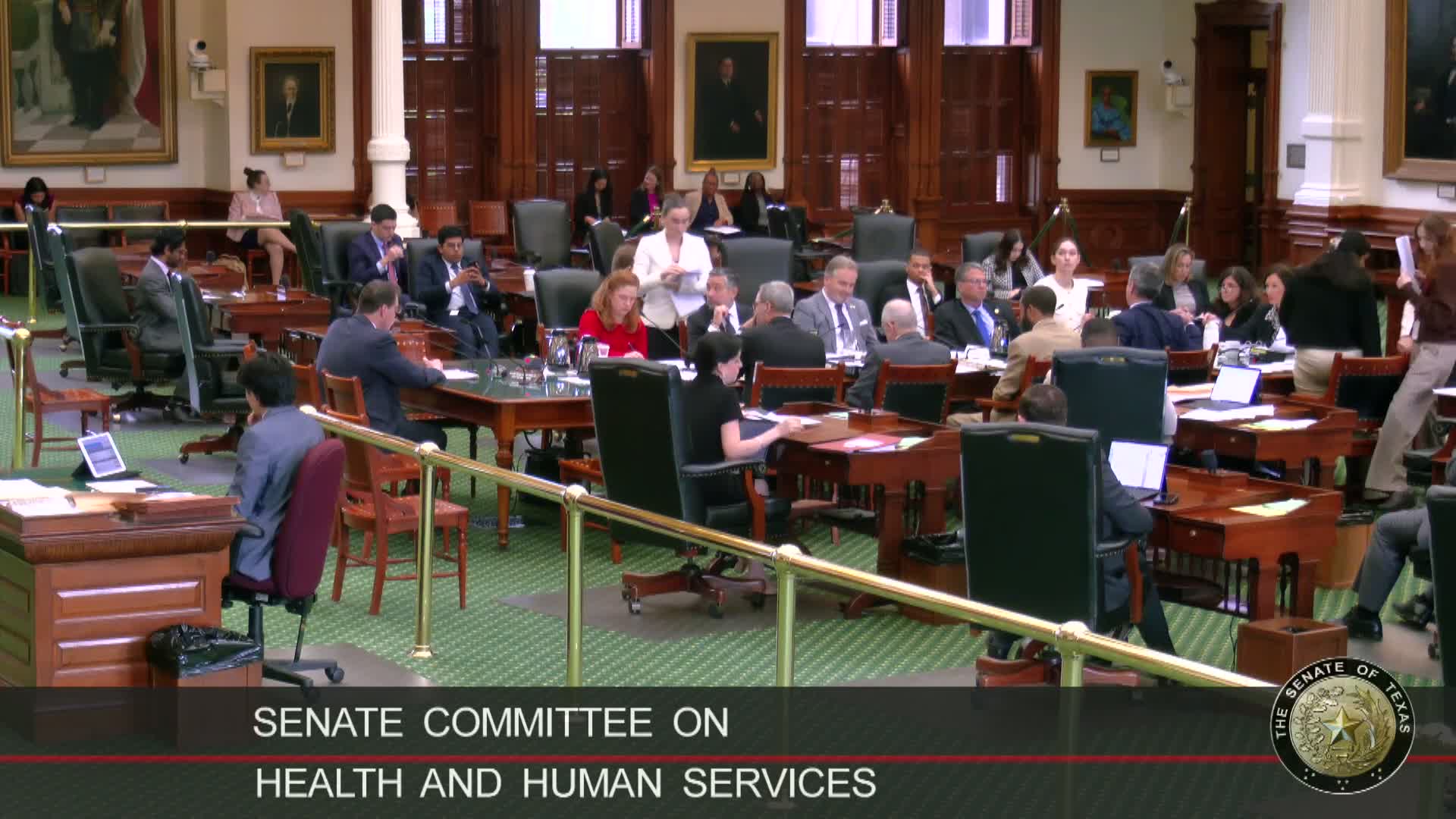Committee debates shifting arbitration costs in out‑of‑network payment disputes
April 30, 2025 | Committee on Health & Human Services, Senate, Legislative, Texas
This article was created by AI summarizing key points discussed. AI makes mistakes, so for full details and context, please refer to the video of the full meeting. Please report any errors so we can fix them. Report an error »

Senate Bill 2805, introduced by Sen. Hagenbuch, drew significant committee discussion as members considered changes to the arbitration process used to resolve payment disputes between health plans and out‑of‑network providers for emergency care and diagnostic services.
What the bill would change: The bill clarifies the statutory definition of “out‑of‑network provider” by listing standard group identifiers (for example, group NPI and employer identification number) to reduce administrative ambiguity. It also alters the fee structure for the Texas Department of Insurance arbitration process by requiring the “losing party” to pay the full cost of arbitration rather than splitting the fee evenly.
Sponsor's rationale and supporters: Sen. Hagenbuch argued the change would discourage frivolous disputes and encourage settlement because the losing party would face the arbitration cost; several provider witnesses, including the Texas Medical Association and independent anesthesiologists, testified in support, saying arbitration fees currently deter smaller providers from seeking payment. “This will allow groups to bundle claims and reduce the number of fees that are actually filed,” Bonnie Bruce of US Anesthesia Partners told the committee.
Opposition concerns: Jamie Dudensing of the Texas Association of Health Plans opposed the bill, saying it would upend a carefully negotiated framework enacted in 2019 that removed balance billing from patients and used arbitration to set payments. Dudensing said the 2019 law intentionally discouraged a “loser‑pays” scheme to avoid shifting costs to plans and, ultimately, premiums. Health‑plan representatives argued that the earlier compromise and ongoing data collection are working to limit surprise bills and maintain market‑based rates.
Committee questions and technical issues: Senators asked practical questions about how to determine the “winner” in cases resolved partway between the parties’ last offers, whether a “closest to the arbitrator’s award” metric would apply, and whether a loser‑pays rule would reduce the number of arbitrations as intended. Witnesses noted most disputes settle during an informal conference; TDI data referenced in the hearing showed the average amount awarded in an arbitration is substantially higher than the carriers’ initial payment, and that arbitration fees average roughly $1,200.
Outcome and next steps: The committee heard invited and public testimony and left the bill pending. Members indicated they may consider technical amendments addressing how to determine the winning party and whether to cap arbitration fees or otherwise preserve incentives to resolve disputes outside arbitration.
What the bill would change: The bill clarifies the statutory definition of “out‑of‑network provider” by listing standard group identifiers (for example, group NPI and employer identification number) to reduce administrative ambiguity. It also alters the fee structure for the Texas Department of Insurance arbitration process by requiring the “losing party” to pay the full cost of arbitration rather than splitting the fee evenly.
Sponsor's rationale and supporters: Sen. Hagenbuch argued the change would discourage frivolous disputes and encourage settlement because the losing party would face the arbitration cost; several provider witnesses, including the Texas Medical Association and independent anesthesiologists, testified in support, saying arbitration fees currently deter smaller providers from seeking payment. “This will allow groups to bundle claims and reduce the number of fees that are actually filed,” Bonnie Bruce of US Anesthesia Partners told the committee.
Opposition concerns: Jamie Dudensing of the Texas Association of Health Plans opposed the bill, saying it would upend a carefully negotiated framework enacted in 2019 that removed balance billing from patients and used arbitration to set payments. Dudensing said the 2019 law intentionally discouraged a “loser‑pays” scheme to avoid shifting costs to plans and, ultimately, premiums. Health‑plan representatives argued that the earlier compromise and ongoing data collection are working to limit surprise bills and maintain market‑based rates.
Committee questions and technical issues: Senators asked practical questions about how to determine the “winner” in cases resolved partway between the parties’ last offers, whether a “closest to the arbitrator’s award” metric would apply, and whether a loser‑pays rule would reduce the number of arbitrations as intended. Witnesses noted most disputes settle during an informal conference; TDI data referenced in the hearing showed the average amount awarded in an arbitration is substantially higher than the carriers’ initial payment, and that arbitration fees average roughly $1,200.
Outcome and next steps: The committee heard invited and public testimony and left the bill pending. Members indicated they may consider technical amendments addressing how to determine the winning party and whether to cap arbitration fees or otherwise preserve incentives to resolve disputes outside arbitration.
View full meeting
This article is based on a recent meeting—watch the full video and explore the complete transcript for deeper insights into the discussion.
View full meeting
